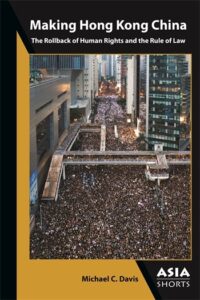 Hong Kong could face a worse fate than becoming “just another Chinese city”, according to a prominent expert.
Hong Kong could face a worse fate than becoming “just another Chinese city”, according to a prominent expert.
“I think the risks are greater than that, because Hong Kong is a peripheral community and there’s still a lot of difference between Hong Kong and the mainland,” Michael C. Davis told the Hong Kong Free Press. “So it may be more of turning Hong Kong into a Tibet or a Xinjiang. Ordinary mainland cities will not have a very substantial base of opposition, whereas these peripheral areas of China have significant opposition.”
Asked how he assesses the state of human rights in Hong Kong under the national security law, he said: “Its horrible. Virtually the entire national security law is a human rights violation.”
It is “without a question” that the law was designed to quash dissent. “My impression is that they are targeting for arrest people who have long been on their list – so the law’s not retroactive, they’re actually picking on the people they already don’t like,” said Davis, author of a new book, “Making Hong Kong China The Rollback of Human Rights and the Rule of Law“:
 In view of Beijing’s growing control over Hong Kong, Davis said the grim reality may be that many Hongkongers will emigrate. “I think Hong Kong people mostly have very little hope at this point. And so then the question becomes: What next? My guess is that we’ll see lots of immigration.” This would be an incalculable loss to Beijing. “Hong Kong has been an extraordinarily valuable asset to China. It’s basically China’s New York or London so we just don’t know the cost of this diminution of Hong Kong that occurs if these hardline policies are not pulled back.”
In view of Beijing’s growing control over Hong Kong, Davis said the grim reality may be that many Hongkongers will emigrate. “I think Hong Kong people mostly have very little hope at this point. And so then the question becomes: What next? My guess is that we’ll see lots of immigration.” This would be an incalculable loss to Beijing. “Hong Kong has been an extraordinarily valuable asset to China. It’s basically China’s New York or London so we just don’t know the cost of this diminution of Hong Kong that occurs if these hardline policies are not pulled back.”
How can one of the world’s most free-wheeling cities transition from a vibrant global center of culture and finance into a subject of authoritarian control? Please attend a virtual lecture with Michael C. Davis, Visiting Professor, University of Hong Kong; Global Fellow, Woodrow Wilson International Center for Scholars, Washington DC; Professor of Law and International Affairs, O.P. Jindal Global University in India, and a former Reagan-Fascell fellow at the National Endowment for Democracy (NED). Moderated by: Andrew Nathan, Class of 1919 Professor of Political Science, Columbia University. October 26, 2020. 12:00 PM – 1:30 PM. RSVP







